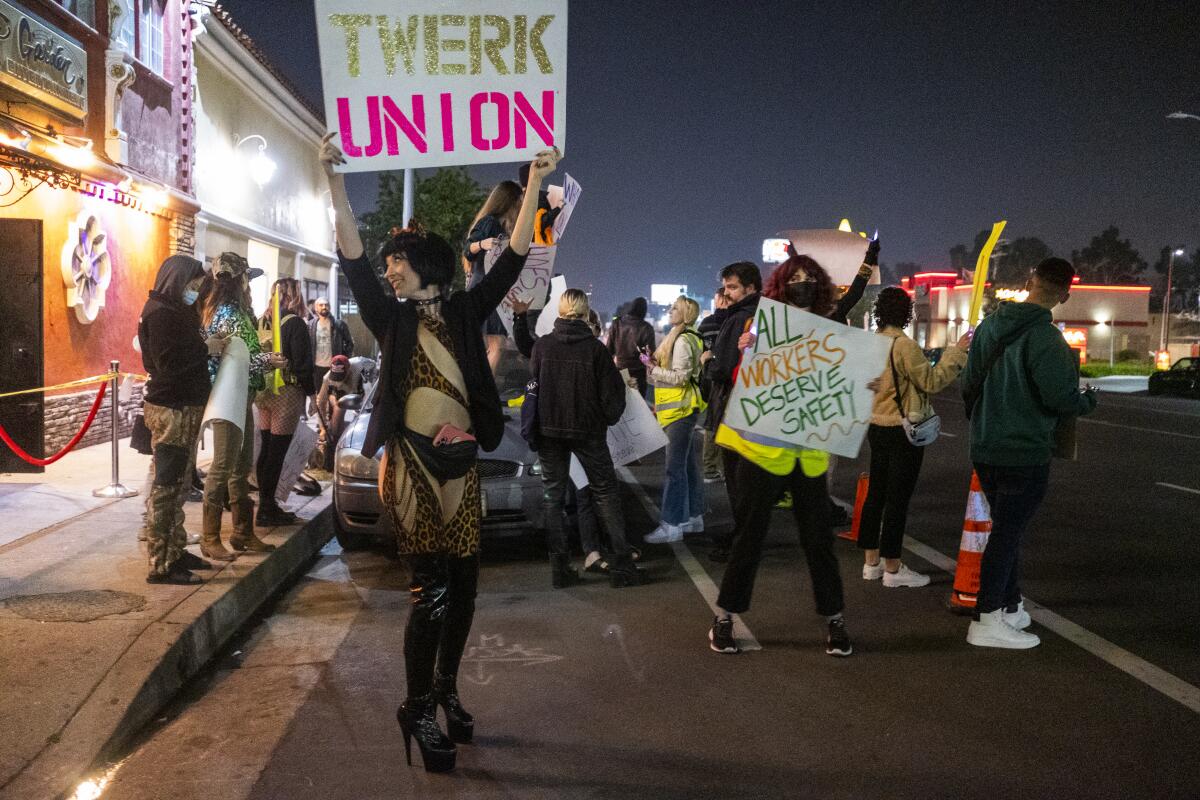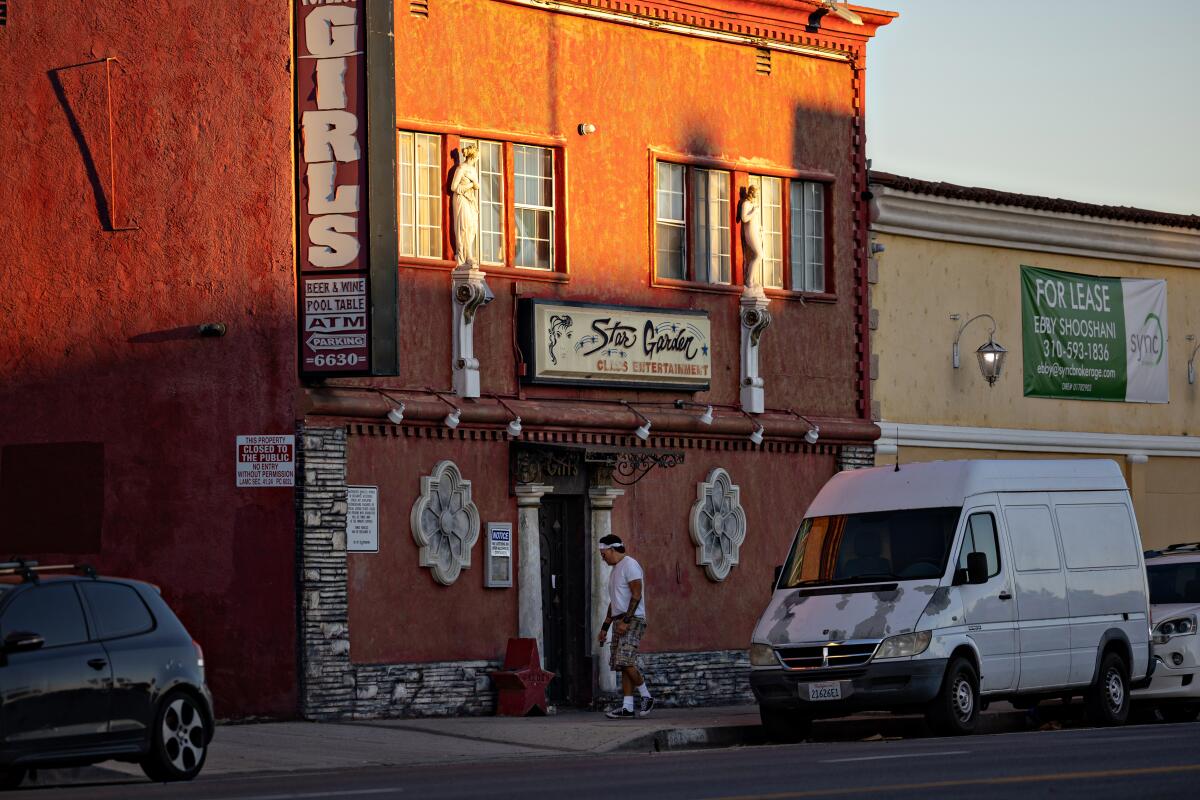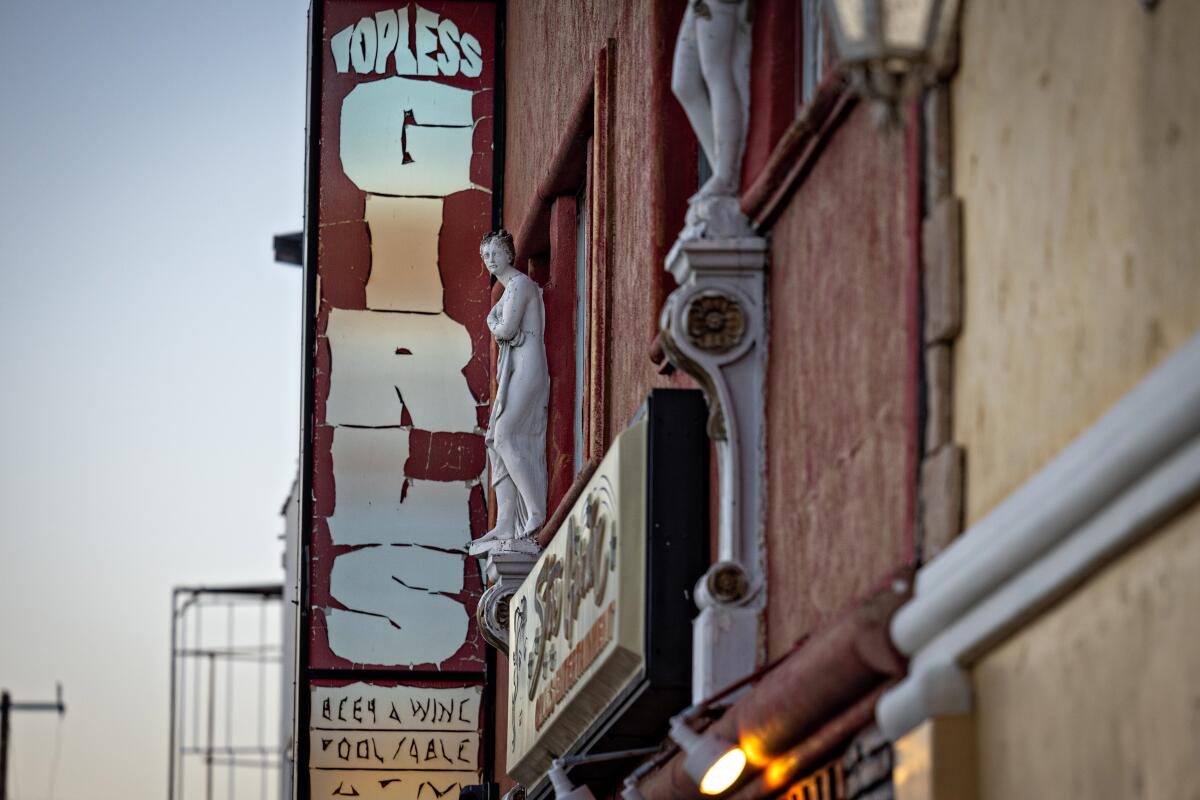The evening air crackles with an optimistic energy outside Star Garden, a small strip club in North Hollywood.
Dancers outside encourage people to enter the coral pink building and spend their money on a hot August night. Rage Against The Machine’s Tom Morello croons union songs and strums his guitar. Striking actors and writers whoop and cheer as they line up at the door. Passing cars honk in support.
“If you’re prepared to go to the club tonight, please do so,” says a dancer who goes by the stage name Velveeta. She speaks through a megaphone. “Party with us.”
The scene is a notable shift from last year, when dancers were urging customers to boycott the club.
It’s the evening of Star Garden’s reopening, the first time the club’s unionized dancers will grace its stage. It’s a night of celebration and reconciliation that marks the end of a tumultuous 17 months during which club management fired more than a dozen dancers, contested the results of a union election held by its strippers, filed for bankruptcy and shuttered its doors.
The peace turns out to be short-lived. And tensions remain as the group of about a dozen dancers negotiate for better pay and working conditions, backed by the century old Actors’ Equity Assn. — spearheading a push to bring formal job protections to a historically marginalized industry.
With the formal recognition of their union, Star Garden dancers became the first at a U.S. strip club to unionize in more than two decades. But they weren’t the last. In mid-September, 16 dancers at northwest Portland’s Magic Tavern followed their lead, unanimously voting to join Actors’ Equity.
As newly unionized units at Star Garden and Magic Tavern negotiate their first contracts, their gains could set a precedent for dancers at other clubs looking to unionize.
Star Garden dancers cheer each other on as they return to work on the bar’s reopening weekend.
(Jason Armond / Los Angeles Times)
Star Garden dancers attended twice-a-month bargaining sessions with management in July and August to hash out terms of the Aug. 24 reopening. But dancers and management agreed on very little. Few dancers were scheduled to perform and management floated the idea of a cover charge that dancers disagreed with.
“It’s kind of like walking into battle because it doesn’t feel like we are working together yet. But we are still hopeful.”
— Reagan, a Star Garden dancer
Star Garden did agree to renovate the club and addressed many environmental safety hazards dancers raised, reinstalling the pole right side up and steam cleaning carpeted areas, for example. The club also agreed to equip security guards with metal detectors, a safety measure dancers requested.
“It’s kind of like walking into battle because it doesn’t feel like we are working together yet. But we are still hopeful. I’m curious how this is going to play out,” says Reagan, a Star Garden dancer who helped organize protests after she was fired last year. She and other dancers interviewed by The Times spoke on the condition they be identified by only their stage names.
As the hours pass, frustration grows.
The small crowd on the sidewalk outside Star Garden is indignant about a newly instituted $40-a-person cover charge, which is significantly higher than at nearby bars, dancers say. When a man at the front of the line complains about the charge, the owner refuses to let him in.
Customers who make it inside report back. Drink prices have ratcheted up, and it’s a surprise that the bar has gone cashless and removed its ATM. Management is also discouraging customers from tipping with cash, dancers say.
Dancers and their supporters accuse Star Garden management of pricing drinks and cover fees in bad faith in an effort to deter customers, demoralize dancers and weaken resolve in contract negotiations.
Management took some cash payments, but refused to give change, says a dancer who goes by the stage name Charlie.
“That’s not how strip clubs are supposed to work. People came prepared to spend cash, obviously,” Charlie says. “It’s really shocking and hard to hear.”
Lisa Howe arrives at Star Garden to support her daughter, a dancer who goes by the stage name Sinder. Howe, taken aback and upset at the $40 charge, decides against paying it.
Star Garden’s owner “doesn’t care about anyone but himself,” Howe says. “The girls are so strong, they stuck to their guns and they did what they had to do … they’re a real family.”

Union buttons on a table outside the Star Garden as the North Hollywood club reopens after strippers won union recognition.
(Jason Armond / Los Angeles Times)
Star Garden owner Stepan K. Kazaryan periodically comes to the front door to peek at the crowd outside. When a Times reporter approaches the door and asks to speak with Kazaryan or other representatives of Star Garden management, a security guard says the owner will not speak with news media.
Reached by phone, An Ruda, an attorney representing Kazaryan, says changes instituted by ownership such as the $40 cover charge were necessary new revenue streams.
“We are trying to make sure there’s enough revenue to grow and sustain the business,” she says. “The dancers would like to see it lowered but that is really something that is a decision for the business to make, it’s not a term and condition of their employment.”
Ruda also represents management at the Los Angeles Times in union contract negotiations.
“Unionizing any place is difficult. Unionizing a strip club is orders of magnitude more difficult.”
— Frankie Butler, Writers Guild of America member who showed up to support the dancers on opening night.
Some patrons are undeterred by the fee.
“It’s incredible what these dancers have managed to do. Unionizing any place is difficult. Unionizing a strip club is orders of magnitude more difficult,” says Frankie Butler, a member of Writers Guild of America who lined up outside Star Garden on opening night.
Butler and other writers came to show support because strippers did the same for them at their picket line. “They brought such great energy,” Butler says. “The obvious solidarity move is to come here.”
“On the sidewalk out here we create a little bit of the world we would like to one day see, of joy and solidarity, strippers and farm workers and hotel workers and actors all having a ball. Inside it’s an entirely different story,” says Morello, of Rage Against the Machine, who frequently joined dancers picketing last year.
The strip club in North Hollywood was jolted out of obscurity in March of last year when more than a dozen dancers began picketing outside the club. The club fired the group of dancers after they voiced concerns that security guards failed to step in when customers became aggressive or threatening. Dancers began protesting when club management refused to engage and locked them out.
The dancers proceeded to file unfair labor practice claims against the club with the National Labor Relations Board, alleging they were unlawfully fired. They also complained to state regulators about physical and environmental hazards in the workplace, alleging more than 30 violations of health and safety laws.

Star Garden dancers protested outside the club last year, urging customers to boycott.
(Francine Orr / Los Angeles Times)
In August 2022, the group of strippers, in a landmark move, filed a petition for a union election with the NLRB, seeking to join Actors’ Equity Assn., an established union that represents actors and stage managers on Broadway and at venues such as the Hollywood Pantages Theatre.
The club fought against a union election, contending that its business did not fall under the NLRB’s jurisdiction because it did not gross annual revenue of $500,000 or more.
The federal labor board ultimately disagreed with the claim and in October 2022 it ruled that strippers at the North Hollywood bar would be allowed to vote in a mail-in ballot election over whether to unionize.
The labor board tallied results of the election the next month, but couldn’t make a determination in the election because a majority of ballots were challenged by Star Garden, which denied that the dancers were employees of the club.
In early 2023, Star Garden filed for Chapter 11 bankruptcy protection from creditors, petitioning the court to allow the owner to convert the strip club into a pool hall or to close it entirely.
Actors’ Equity accused Star Garden management of making changes without Bankruptcy Court approval, firing remaining dancers, ceasing operations as a strip club and closing most nights. The union filed a labor complaint alleging that letting remaining dancers go violated federal labor law and was intended to quell organizing activity.
About a week before strippers and the club were scheduled to testify at an NLRB hearing in late May, Star Garden abruptly changed course and asked to settle the dispute.
Attorneys representing the club in May withdrew challenges to the election and agreed to recognize the union, dissolve the bankruptcy claim and reinstate fired strippers.

Star Garden reopened Aug. 24 after its exotic dancers won union recognition earlier this year.
(Jason Armond / Los Angeles Times)
From the ownership’s perspective the reopening was a success, says Ruda, Star Garden’s attorney. Customers returned and there weren’t any security concerns, she says.
“I think the general consensus was the reopening was a positive experience for everybody,” Ruda says.
Dancers and Actors’ Equity officials say that although getting the club to reopen was a win, management’s attitude and the way it has chosen to operate the club is concerning.
“Some of the actions taken by the club’s owners have not been in the spirit of the agreement reached last May, such as excessively high cover charges that only serves to chase away patrons,” says Andrea Hoeschen, general counsel for Actor’s Equity. “We’re hashing out items at the bargaining table, and we have no plans to go away.”
Going into reopening night, dancers say they hoped the energy and patronage of union supporters as Star Garden gets up and running again would show management it should work more closely with dancers to build up business, retain customers and improve workplace conditions.
But a month into Star Garden’s new chapter, the environment inside is bleak at times, dancers say. Management turns away customers at the door at random, prohibits phone use inside and tells dancers they must stay within lines drawn around the pole — a space too small and restrictive for them to actually dance, they say.
Dancers are paid minimum wage, plus tips they earn from performing on stage; they are no longer paid for performing lap dances. (Previously, dancers would take home up to 50% of fees from dances they sold, including lap dances priced at $30 and $100 15-minute “VIP” dances in a semi-secluded booth, according to testimony that dancers submitted to the federal labor board.)

Star Garden’s dancers, who won membership in Actors’ Equity Assn., continue to negotiate for a labor contract.
(Jason Armond / Los Angeles Times)
Rules management has instituted are unreasonable and do not have a clear purpose other than to make “absolutely trash fire conditions,” Charlie says. Dancers, she says, don’t feel comfortable performing lap dances until they get a fair cut, and drink prices remain “ridiculously inflated” with water about $15 and a shot costing upward of $20.
Charlie estimates the club on average brings in five to 10 customers each night. She says she repeatedly finds herself placating customers who are upset at the high prices.
“People are like, this sucks, why are we here? Not only are they confused and disappointed, but they are angry, and we’re the ones who have to deal with it,” she says. “It’s challenging to have that conversation over and over.”
A dancer who goes by the stage name Lillith says the club’s security practices have improved and she feels safer and more protected. Some dancers have adapted and experimented with “quirky performance art” in response to the restrictive stage space.
Last week, the club agreed to reduce the cover charge to $25 from $40; it continues to enforce a one-drink-minimum policy.
Seeing the cover charge reduced “showed that we do have a say in how this club operates, and we’re hoping to see a lot more steps in a better direction,” Lillith says.
Overall, strippers’ concerns at the bargaining table are similar to other units Actors’ Equity represents, Hoeschen says. “They perform on stage in front of people, they have security concerns, safety concerns, their dressing rooms need to be kept clean, so there’s a lot of overlap,” she says.
Compensation is the issue that management and dancers are furthest apart on — as is typical of most labor negotiations, Hoeschen says. “That’s the big one,” she says.
Hoeschen declined to provide specifics on wage proposals.
As management and the unionized dancers hash out their first contract, Ruda says she has asked both sides to “give each other compassion and grace.”
“On the management side they’re learning to engage positively with the union, everyone has a learning curve right now.”
A dancer who goes by the stage name Wicked says she reminds herself that negotiations are in progress and each small win matters.
“They are exerting control over whatever they can … and they are seeing that it isn’t working so well,” she says. “This is not done. Nothing is set until we have that first contract.”
This story originally appeared on LA Times

